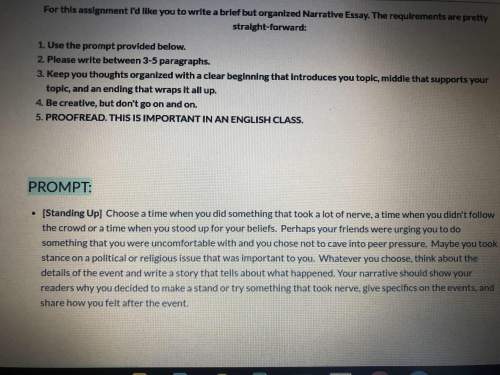
English, 04.03.2021 17:20 stormserena
Read the sentences below from “Federigo’s Falcon.” Describe how each sentence’s diction affects your feelings about the story and your understanding of it. Then rewrite the sentences using different words, but keep the meaning the same. You can choose to rewrite the sentences more formally or informally. You can even use slang. Break up the original sentence into two or more sentences if you like.
When he found himself the husband of such a great lady, whom he had loved so much and who was so wealthy besides, he managed his financial affairs with more prudence than in the past and lived with her happily the rest of his days.
When the lady heard and saw this, she first reproached him for having killed such a falcon to serve as a meal to a woman; but then to herself she commended the greatness of his spirit, which no poverty was able or would be able to diminish; then, having lost all hope of getting the falcon and, perhaps because of this, of improving the health of her son as well, she thanked Federigo both for the honor paid to her and for his good will, and she left in grief, and returned to her son.

Answers: 1
Another question on English

English, 21.06.2019 15:10
From his studies of coptic, champollion knew that the egyptian word for "sun" was pronounced rah. he wrote down the first two letters of that sound, ra. next he put a question mark for the unknown middle hieroglyph. then, at the end, he wrote ss, the sound of the last two hieroglyphs. he studied the combination: ra ? ss. suddenly he remembered a famous pharaoh whose name appeared in ancient greek chronicles and also in the biblical book of exodus: rameses, or ramesses. could this be a hieroglyphic representation of ramesses' name? based on the excerpt, what detail did champollion need to conclude that the hieroglyphics might represent ramesses’s name?
Answers: 2

English, 22.06.2019 05:20
Plz which of the following is true about third-person limited point of view? it uses the word i, and one character tells the story. it uses the word you and makes the reader feel a part of the story. the narrator is not part of the story and only states the characters' actions and speech. the narrator is not part of the story but knows what one character is thinking and feeling.
Answers: 1

English, 22.06.2019 10:30
In which of the following excerpts from "the yellow wall paper" does author charlotte perkins gilman seem to mock the romantic belief in the supernatural? a. a colonial mansion, a hereditary estate, i would say a haunted house, and reach the height of romantic felicity—but that would be asking too much of fate! b. there is a delicious garden! i never saw such a garden—large and shady, full of box-bordered paths, and lined with long grape-covered arbors with seats under them.c. the color is repellent, almost revolting; a smoldering unclean yellow, strangely faded by the slow-turning sunlight.d. then i peeled off all the paper i could reach standing on the floor. it sticks horribly and the pattern just enjoys it!
Answers: 1

English, 22.06.2019 11:00
The dog high-tailed it out of here is an example of personification simile theme idiom
Answers: 1
You know the right answer?
Read the sentences below from “Federigo’s Falcon.” Describe how each sentence’s diction affects your...
Questions

Spanish, 29.07.2019 10:50

English, 29.07.2019 10:50

Mathematics, 29.07.2019 10:50

History, 29.07.2019 10:50

Mathematics, 29.07.2019 10:50

Social Studies, 29.07.2019 10:50

Mathematics, 29.07.2019 10:50

Advanced Placement (AP), 29.07.2019 10:50

Mathematics, 29.07.2019 10:50

History, 29.07.2019 10:50

English, 29.07.2019 10:50

Social Studies, 29.07.2019 10:50






Mathematics, 29.07.2019 10:50





